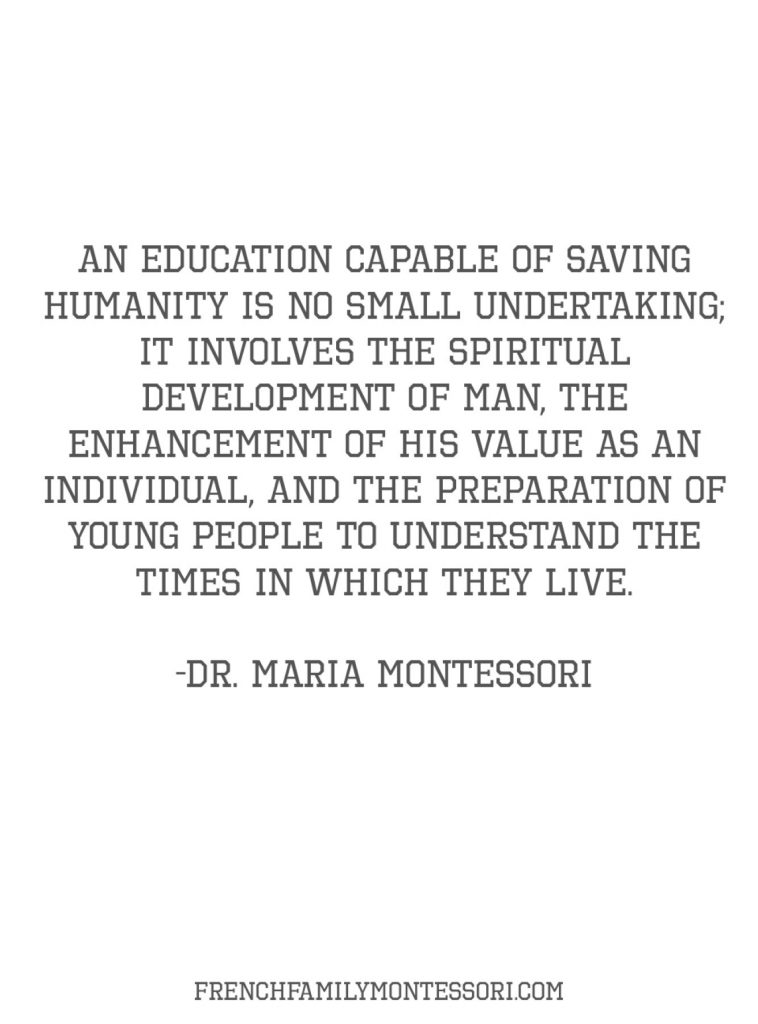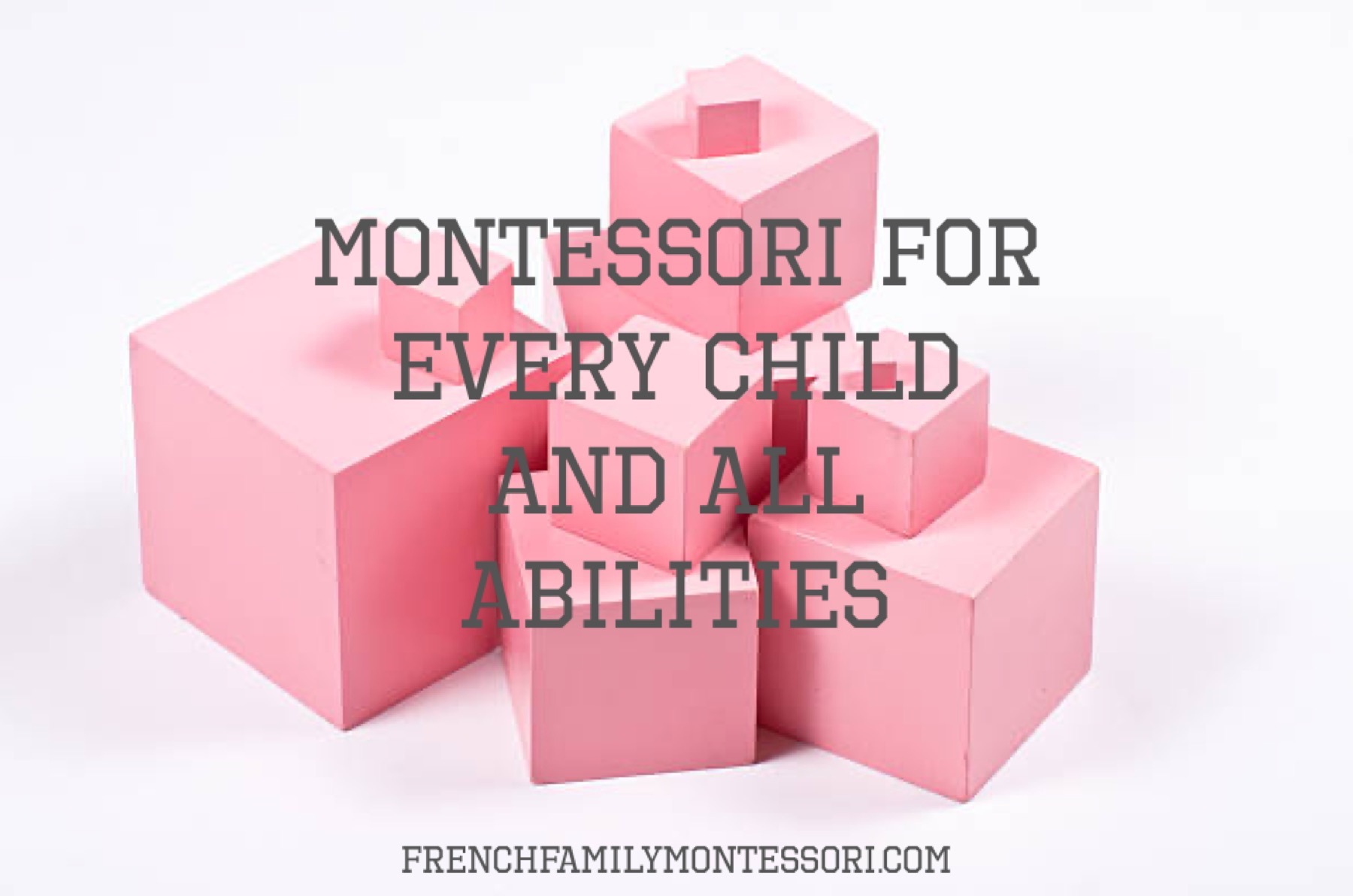“Children are human beings to whom respect is due, superior to us by reason of their innocence and of the greater possibilities of their future… Let us treat them with all the kindness which we would wish to help to develop in them.” -Maria Montessori
At 12 weeks of pregnancy, an ultrasound led our doctors to believe that V had Down syndrome. It was too late to secure a diagnose with a blood test and I refused amniocentesis. The only reason for wanting to know was to be prepared medically. We were planning on having a home birth, but with potential complications, we wanted to be sure she joined our family in a way that was best for her. Any differences she may have had didn’t change the fact that she and E were loved unconditionally from day one.
We had already planned on a Montessori lifestyle. My experience with Montessori, as an Autistic, is that it truly is meant for ALL children. Dr. Montessori herself worked with several children with a variety of abilities. So there was no need to change the way both girls were to be raised. Montessori is for everyone.
What makes Montessori and its principles a great fit for every child and all abilities?
-Respect the child. We teach the child manners and respect by modeling the same to them. We kneel down to the child so that we may make eye contact and devote our full attention to them. We don’t talk over them and don’t speak ill of them (in front of them or behind their back). We also respect their privacy; this is why we refer to the girls by their first initial and I ask T for permission to share photos and stories. I would never share something that put them in bad light or they might find embarrassing at some point. We also respect their choices and decisions about their body, never forcing hugs and such.

– Follow the child. We observe what the child’s current needs are and offer work that meets those needs. This does not mean allowing the child to do whatever they want. Rather it means watching for what the child is ready to learn, not what we think they should be learning based on their age or peers’ abilities. Each child is unique and they deserve to be recognized, honoured, and celebrated as such.
-Educate the child as a whole. Meeting their cognitive, emotional, social, and physical needs.
-Offer child-size materials. An excellent example of this is practical skill tools. A child wants to do as we do. This includes practical life skills, such as sweeping. Providing them with the same broom I use, one that they are unable to handle properly, is setting them up for failure. By using a Swiffer, and removing a few of the handle extenders, it becomes the perfect size for a child to maneuver. Thus preparing the child for success.
-Offer materials that work for them. Offering materials that meet current developmental needs, not based on age and what a child “should” be doing. Even with the girls, who are 12 minutes apart, one may be able to accomplish an activity while the other is unable. Instead, we provide them with separate activities that they are able to accomplish. Some Montessori families, ours included, prefer to be screen-free. But for some children, an iPad is the material that they need to communicate and learn. It’s what helps them meet their full potential. Always remember, what works for one family may not necessarily work for another. You must always do what is best for you and your family.
-A prepared and attractive environment. Providing a safe and welcoming place for independence. Opportunities for hands-on experiences, freedom to explore freely within limits and without interruption, encouraging concentration. Materials are placed on shelves at the child’s level so they may reach them without assistance. Pictures are hung at their eye level, as they too deserve an attractive environment. Offering isolated activities, not activities that are too busy. An example would be a toy that teaches colour sorting, shapes, and counting all-in-one.
You may not know that Hubby runs an Etsy shop, FrenchFamilyWorkshop. 10% of gross sales (not profit, but gross) goes to a wonderful nonprofit that we feel embodies the work of Dr. Montessori. They provide children of different abilities with the proper equipment so they are able to meet their full potential. Assisting in life-saving and enhancing, I strongly urge you to check them out at Lori’s Voice.
“I followed these children, studying them, studied them closely, and they taught me how to teach them.” -Maria Montessori
Changing the world. From a time when differences weren’t celebrated, Maria worked with children of different abilities. In 1900, she became co-director of Scuola Magistrale Ortofrenica and trained teachers how to work with children who had special needs. Prior to becoming co-director, influenced by Itard (who had worked with Victor of Aveyron) and Seguin, she began developing her method that would go on to benefit all. “Times have changed, and science has made great progress, and so has our work; but our principles have only been confirmed, and along with them our conviction that mankind can hope for a solution to its problems, among which the most urgent are those of peace and unity, only by turning its attention and energies to the discovery of the child and to the development of the great potentialities of the human personality in the course of its formation.” -Maria Montessori
